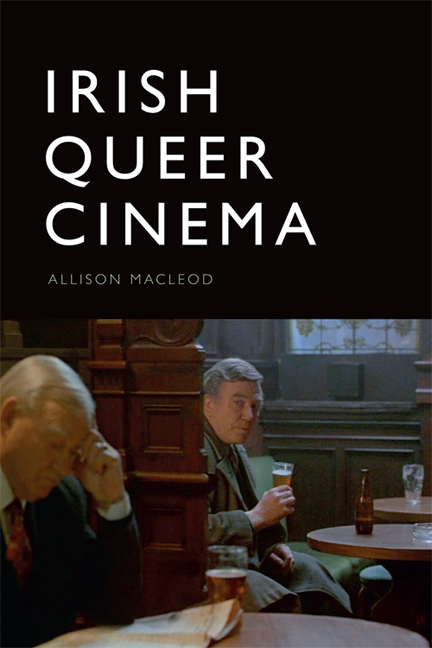Book contents
- Frontmatter
- Contents
- List of Figures
- Acknowledgements
- 1 Queerly National and Nationally Queer: Paradoxes of an Irish Queer Cinema
- 2 Mapping Ireland’s Queer Films
- 3 Re-imagined Kinship and Failed Communities
- 4 The Contested Space of the Irish Pub
- 5 Compartmentalised Cosmopolitans and Rigid Fluidity
- 6 The Queerly Productive Constraints of Rural Space
- 7 Queer Mobilities and Disassociated Masculinities
- 8 Contested Belongings within Diasporic Space
- 9 The Irish Queer Short Film
- 10 Concluding Remarks
- Select Filmography
- Bibliography
- Index
3 - Re-imagined Kinship and Failed Communities
Published online by Cambridge University Press: 04 May 2021
- Frontmatter
- Contents
- List of Figures
- Acknowledgements
- 1 Queerly National and Nationally Queer: Paradoxes of an Irish Queer Cinema
- 2 Mapping Ireland’s Queer Films
- 3 Re-imagined Kinship and Failed Communities
- 4 The Contested Space of the Irish Pub
- 5 Compartmentalised Cosmopolitans and Rigid Fluidity
- 6 The Queerly Productive Constraints of Rural Space
- 7 Queer Mobilities and Disassociated Masculinities
- 8 Contested Belongings within Diasporic Space
- 9 The Irish Queer Short Film
- 10 Concluding Remarks
- Select Filmography
- Bibliography
- Index
Summary
The Irish family is a consistent trope in Irish cinema, from the unhappy, poverty stricken Catholic upbringing Frank McCourt experiences in Angela's Ashes (Parker 1999) to the resilient and suffering matriarchal figure of Mrs Brown in My Left Foot (Sheridan 1989), to the troubled father-son and brother relationships that structure the narratives of In the Name of the Father (Sheridan 1993), How Harry Became a Tree (Paskaljevic 2001) and The Wind that Shakes the Barley (Loach 2006). Frequently operating as microcosms for Irish society, these on-screen families are subject to those greater forces affecting Ireland as a whole: economic poverty, mass emigration, political violence and religious oppression.
Such family narratives reflect the central position that the Irish family has historically occupied within Irish nationalist discourses and in the doctrine and teachings of the Catholic Church. Article 41 of the 1937 Constitution of Ireland directly positions a stable family unit as synonymous with stable social institutions and a stable nation-state with its decrees that ‘the State recognises the Family as the natural primary and fundamental unit group of Society’ and ‘the State, therefore, guarantees to protect the Family in its constitution and authority, as the necessary basis of social order and as indispensable to the welfare of the Nation and the State’ (Bunreacht na hÉireann 1999). From the 1970s onwards, successive legislative battles surrounding the legalisation of contraception, abortion, divorce and homosexuality in Ireland revealed the active roles played by the Irish State and the Catholic Church in regulating sexual practices and sexuality through the institution of the family. The Granard tragedy, the Kerry babies, the ‘X’ case and the Kilkenny Incest case further exposed the family as a space of crisis (see note 1 on page 12).
As these highly publicised legislative battles and sexual scandals brought issues surrounding Irish family life and the regulation of sexuality to the forefront of the public consciousness, Irish filmmakers responded by using family narratives to signify a profound national crisis. Ruth Barton argues that First Wave films frequently used a counter-narrative of the Irish family (as nation) to critique contemporary Irish society and its imagined national community: ‘The discursive trope of denying the notional happy family and of refictionalising it as an oppressive, verging on dysfunctional, institution … refutes the ideal of the Irish as “one happy family” and legitimises social alternatives to the biological family’ (2004: 96).
- Type
- Chapter
- Information
- Irish Queer Cinema , pp. 28 - 47Publisher: Edinburgh University PressPrint publication year: 2018



